八年级英语上人教版Unit_1:Where_did_you_go_on_vacation_Section_A陈宁
最新人教版八年级英语上册八年级上Unit1Where_did_you_go_on_vacation全单元

New York City.
go to New York City.
Where did she go on vacation?
She went to New York City.
Where did they go on vacation?
gowent to summer camp They to summer camp.
go out with anyone?
Places New York Grace City Kevin the beach
Did you … go to Central Park? play volleyball? swim? go to the movies? study for exams?
Yes No
Notes
(3)some-不定代词,通常用于肯定句中;any-不定代 词则邀请、预料对方会作肯定回答 时的疑问句中。 Someone called her last week. There isn’t anyone else there. Is anybody over there? Could you give me something to eat? (4)形容词修饰不定代词时,通常要放在不定代词之后
Where did they go on vacation?
They go to went theto mountains the mountains.
Where did you go on vacation?
We went go toto the the beach beach.
Where did they go on vacation?
√ √ √ √ √
八年级新目标上unit_1_Where_did_you_go_on_vacation_知识点
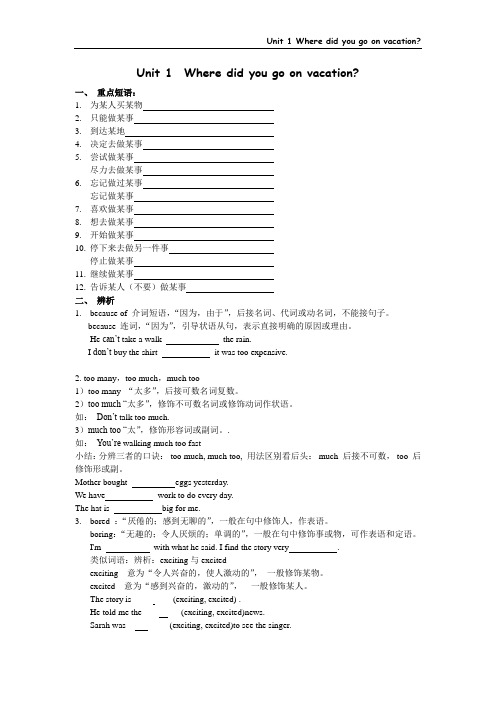
Unit 1 Where did you go on vacation?一、重点短语:1.为某人买某物2.只能做某事3.到达某地4.决定去做某事5.尝试做某事尽力去做某事6.忘记做过某事忘记做某事7.喜欢做某事8.想去做某事9.开始做某事10.停下来去做另一件事停止做某事11.继续做某事12.告诉某人(不要)做某事二、辨析1.because of 介词短语,“因为,由于”,后接名词、代词或动名词,不能接句子。
because 连词,“因为”,引导状语从句,表示直接明确的原因或理由。
He can’t take a walk the rain.I don’t buy the shirt it was too expensive.2. too many,too much,much too1)too many “太多”,后接可数名词复数。
2)too much “太多”,修饰不可数名词或修饰动词作状语。
如:Don’t talk too much.3)much too “太”,修饰形容词或副词。
.如:You’re walking much too fast小结:分辨三者的口诀:too much, much too, 用法区别看后头:much 后接不可数,too 后修饰形或副。
Mother bought eggs yesterday.We have work to do every day.The hat is big for me.3.bored :“厌倦的;感到无聊的”,一般在句中修饰人,作表语。
boring:“无趣的;令人厌烦的;单调的”,一般在句中修饰事或物,可作表语和定语。
I'm with what he said. I find the story very .类似词语:辨析:exciting与excitedexciting 意为“令人兴奋的,使人激动的”,一般修饰某物。
excited 意为“感到兴奋的,激动的”,一般修饰某人。
初中英语人教版八年级上册Unit 1 Where did you go on vac

anyone, anywhere, wonderful, few, quite a few, most, most of time, Huangguoshu Waterfall, Central Park
• Where did you go on vacation? I went to the mountains. • Did you go with anyone? Yes, I did. No, I didn’t. • Did you do anything special last month? • Huangguoshu Waterfall is very wonderful, so I took quite a few photos.
根据汉语完成英语句子。 1. Brad played sports __________ ________ __________ (大多数时间) last weekend. 2. Did you buy ____________ ______________(一些特别的东西) in India? 3. Li Ming took ____________ __________ ___________ (相当多) photos in Guizhou. 4. Hi, Helen. ________ _______ ________ __________. (好久不见了). 5. Did Julie go out _____________ _____________(和任何人一起)? 6. Did you go _____________ ______________(任何有趣的地方)? 7. Grace went to ____________ ____________ (中央公园) in NewYork City. 8. I was __________ __________ (在度假) last month.
人教版英语八年级上册Unit-1-where-did-you-go-on-vacation练习题

Unit 1 where did you go on vacation? Ⅰ.写出下列动词的过去式1.bring2.build3.buye5.cost6.do(does)7.drink 11.eat12.feed13.feel14.find15.forget16.get17.go21.have(has)22.keep23.know24.learn25.make26.think27.meet8.sleep9.sing10.see 18.speak19.write20.swim28.take29.teach30.tellⅡ.英汉短语互译1呆在家10 玩得开心19 walk around2 参观博物馆11 因为20 over an hour3 去海滩12 照相21 too many4 去度假13 一碗22 much too5 和某人一起出14 visit sb. 23 come up6 在乡下15 study for a test 24 quite a few7 到达某地16 记日记8 决定做某事17 为某人买某物9 感觉像18 so.....thatⅢ. 用所给词的适当形式填空1 There____(be)many old houses here last year.2 I ____(meet)an actor yesterday.3 She usually ____(have)lunch at home. But yesterday she _____(have)it at school.4 I___(go)to the New York City with my mother last year.5 They____(take)lots of photos last week.6.My daughter ___(not go)to school yesterday?7.----___she ___(practice)her guitar yesterday?-----No, she ___ .8.----What ___you ___(do)last weekend?-----I ___(study)math Saturday.Ⅳ单项选择()1.Was there a school here last year ? No,______.A. There isn’t B there weren’t C there was D there wasn’t ()2.Would you like_____to eat ?A anythingB nothingC somethingD any thing()3.---Where____your grandparents go on their vacation?---They____to the beach.A do, goB did, wentC did, goD do , went()4. Did your mother buy____for you ? ----Yes, she did.A. anything specialB. special anythingC. special something ()5. Don’t worry. There is____time to go.A. LittleB. fewC. a littleD. a few()6.I have nothing to do but____TV.A. watchesB. watchC. watchingD. watched()7. The story is___. I feel so____to read it.A. exciting, excitedB. exciting, excitingC. excited, exciting ()8. Mother bought____eggs yesterdayA. too muchB. much tooC. too many()9. He___the taxi back___here yesterday.A.took, toB. take, toC. took, /D. takes, /()10. My father bought a bike___me?A. withB. toC. forD. At()11. He runs_____.A. enough quicklyB. quickly enoughC. quick enough()12. Last night he___a movie_____animals.A.watches, aboutB. saw, toC. watched, forD. watched, about ()13. Lucy doesn’t feel like_____today ?A. to walkB. walkC. walkingD. walked()14. I hope she can____my uncle with me this week.A. visitB. visitingC. visitsD. visited()15. Why don’t you____your son to the party?A. bringB. takeC. brought D took()16. Nobody__what the future will be like.A knowB knewC knowsD knowing()17. Who did you go to the movie______? ------nobody, I went alone.A withB aboutC forD from()18.______dinner, we had dumplings and chicken.A. InB. ForC. OfD. On()19. My best friend and I enjoyed____around the park.A. walkB. to walkC. walksD. Walking()20. They decide____on May 1st.A.to go fishB.go fishingC.to go fishingD.go fish()21. Yesterday she_____a famous singer and_____her autograph.A.meet, getB.meet, gotC.meeted, gotD.met, got()22. She had fun____on her day____.A.swim,offB.swims, offC.swimming, offD. Swimming, of ()23. How about_____a drink?A.haveB.to haveC.hadD.having()24. —what did you buy for your daughter?—I bought ________, because I cou ldn’t find ________ she likes.A. something, anythingB. anything, somethingC. nothing, anythingD. something, nothing()25. I didn’t go to the mountain_____the bad weather.A.soB.becauseC.because ofD.but()26. She didn’t______me about it.A.toldB.tellC.tellingD.tells()27. Don’t forget____your homework tomorrow.A.bringB.to bringC.broughtD.bringing()28. Mom often tells me____computer games too much.A.not playB.not to playC.not playingD.a play Ⅴ句型转换1.I did my homework yesterday. (改为否定句)I __ ____my homework yesterday.2.She went to New York on vacation(就划线部分提问)___did she___on vacation?3.Lily visited the Great Wall last Sunday.(改为一般疑问句)___Lily___the Great Wall last Sunday?4.He was at home this time yesterday.(改为一般疑问句) ___he at home this time yesterday?5. The students had fun in the park.(改为同义句)The students ___ ___ ___ ___in the park.6.Lucy did her homework yesterday evening.(改为否定句) Lucy ___ ___ ___homework yesterday evening.7.Jim went to the beach last Sunday.(对划线部分提问)___ ___ Jim ___last Sunday?8.They played basketball yesterday.(对划线部分提问)___ ___ they play basketball?9.There was some water in the bottle.(改为否定句) There ___ ___ water in the bottle。
人教版英语八年级上第一单元Unit1Wheredidyougoonvacation知识点梳理

人教版英语八年级上第一单元Unit1Wheredidyougoonvacation知识点梳理Unit 1 Where did you go on vacation?知识梳理一、词型转换Section A1.wonder →(adj.) wonderful2.I →(反身代词) myself3.you →(反身代词) yourself4.yourself →(pl.) yourselves5.seem →(pt.) seemedSection B1.activity →(pl.) activities2.decide →(n.) decision3.try →(pt.) tried4.bike →(同义词) bicycle5.build →(n.) building6.difference →(adj.) different7.like →(反义词) dislike8.below →(反义词) above二、短语归纳Section A1.go to Central Park 去中央公园2.on vacation 在度假3.buy something special 买特别的东西4.meet someone interesing 遇见有趣的人5.go out with someone 和某人一起出去6.take quite a few photos 拍相当多的照片7.most of the time 大多数时间8.go shopping 去购物9.keep a diary 记日记10.of course 当然;自然Section B1.have a good time 玩得高兴;过得愉快2.go to the beach 去海滩3.feel like 感觉像4.the houses of the Chinese traders 中国商人的房子5. a lot of new buildings 许多新的建筑物6.in the past 在过去7.over an hour 一个多小时8.too many people 太多的人9.get to the top 到达顶部10.because of the bad weather 因为不好的天气11.one bowl of fish 一碗鱼肉12.another two hours 另外两个小时13.the top of the hill 山顶14.learn something important 学习重要的东西Self Check1.go to the countryside 去乡下2.in the shopping center 在购物中心3.have a fun time 玩得高兴;过得愉快4.after three hours 三个小时以后5.keep going 一直走6.twenty minutes later 20分钟后重点句子1.Where did you go on vacation?你去哪儿度假的?2.Long time no see.好久不见。
人教版英语八年级上册_Unit_1_Where_did_you_go_on_vacation教材全解
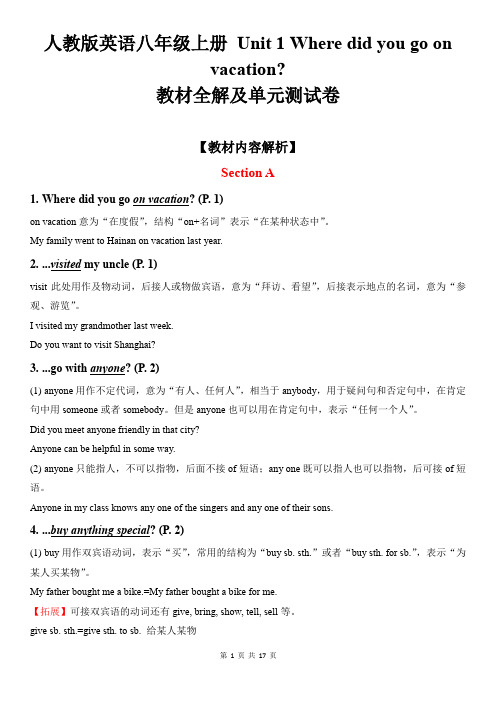
人教版英语八年级上册Unit 1 Where did you go onvacation?教材全解及单元测试卷【教材内容解析】Section A1.Where did you go on vacation? (P. 1)on vacation意为“在度假”,结构“on+名词”表示“在某种状态中”。
My family went to Hainan on vacation last year.2....visited my uncle (P. 1)visit此处用作及物动词,后接人或物做宾语,意为“拜访、看望”,后接表示地点的名词,意为“参观、游览”。
I visited my grandmother last week.Do you want to visit Shanghai?3....go with anyone? (P. 2)(1)anyone用作不定代词,意为“有人、任何人”,相当于anybody,用于疑问句和否定句中,在肯定句中用someone或者somebody。
但是anyone也可以用在肯定句中,表示“任何一个人”。
Did you meet anyone friendly in that city?Anyone can be helpful in some way.(2)anyone只能指人,不可以指物,后面不接of短语;any one既可以指人也可以指物,后可接of短语。
Anyone in my class knows any one of the singers and any one of their sons.4....buy anything special? (P. 2)(1)buy用作双宾语动词,表示“买”,常用的结构为“buy sb. sth.”或者“buy sth. for sb.”,表示“为某人买某物”。
My father bought me a bike.=My father bought a bike for me.【拓展】可接双宾语的动词还有give, bring, show, tell, sell等。
八年级英语上册 unit 1 where did you go on vacation(短语+句型+练习)(新版)人教新目标版
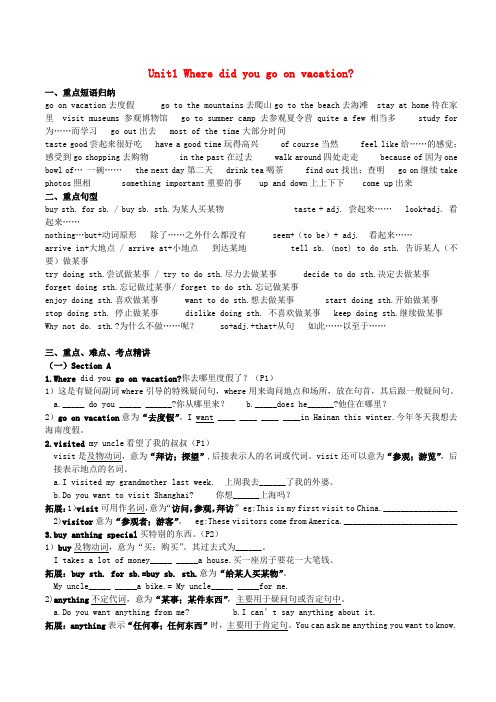
Unit1 Where did you go on vacation?一、重点短语归纳go on vacation去度假 go to the mountains去爬山go to the beach去海滩 stay at home待在家里 visit museums 参观博物馆 go to summer camp去参观夏令营quite a few相当多 study for 为……而学习 go out出去 most of the time大部分时间taste good尝起来很好吃 have a good time玩得高兴 of course当然 feel like给……的感觉;感受到go shopping去购物 in the past在过去 walk around四处走走 because of因为one bowl of…一碗…… the next day第二天 drink tea喝茶 find out找出;查明 go on继续take photos照相 something important重要的事 up and down上上下下 come up出来二、重点句型buy sth. for sb. / buy sb. sth.为某人买某物 taste + adj. 尝起来…… look+adj. 看起来……nothing…but+动词原形除了……之外什么都没有 seem+(to be)+ adj. 看起来……arrive in+大地点 / arrive at+小地点到达某地 tell sb. (not) to do sth. 告诉某人(不要)做某事try doing sth.尝试做某事 / try to do sth.尽力去做某事 decide to do sth.决定去做某事forget doing sth.忘记做过某事/ forget to do sth.忘记做某事enjoy doing sth.喜欢做某事 want to do sth.想去做某事 start doing sth.开始做某事stop doing sth. 停止做某事 dislike doing sth. 不喜欢做某事 keep doing sth.继续做某事Why not do. sth.?为什么不做……呢? so+adj.+that+从句如此……以至于……三、重点、难点、考点精讲(一)Section A1.Where did you go on vacation?你去哪里度假了?(P1)1)这是有疑问副词where引导的特殊疑问句,where用来询问地点和场所,放在句首,其后跟一般疑问句。
(人教版)2020八年级英语上册 Unit 1 Where did you go on vacation讲义+习题 (新版)人教新目标版

Unit1. Where did you go on vacation因为19.one bowl of… 一碗…… 20.the next day 第二天21.drink tea喝茶22.find out找出;查明23.go on继续24.take photos照相25.something important重要的事 26.up and down上上下下27.have a good time玩得高兴=enjoy oneself=have (great) fun1.与seem有关的句式1)seem + 形容词“看起来…..” You seem happy today.2)seem + to do sth. “似乎、好像做某事” I seem to have a cold3)It seems / seemed + 从句“看起来好像…;似乎…”. It seems that no one believe you.4)seem like ….“好像,似乎…..” It seems like a good idea.2. too many,too much,much too1)too many “太多”,后接可数名词复数。
如:Mother bought too many eggs yesterday.2)too much “太多”,修饰不可数名词或修饰动词作状语。
如:3)much too “太”,修饰形容词或副词。
如:小结:分辨三者的口诀: too much, much too, 用法区别看后头: much 后接不可数, too 后修饰形或副。
too many 要记住,后面名词必复数。
7. because:1)because of 介词短语,“因为,由于”,后接名词、代词或动名词,不能接句子。
如:H e can’t take a walk because of the rain.2)because 连词,“因为”,引导状语从句,表示直接明确的原因或理由。
Unit_1_Where_did_you_go_on_vacation说课稿

Unit1 Where did you go on vacation?(period 1)说课稿各位老师,大家好!今天我说课的内容是人教版八年级英语上册第一单元第1 课时。
本课是新授课,下面我将从几个方面来阐述一下我的说课内容。
一、教材及教材内容分析本单元是围绕“与朋友共同回忆假期”为话题,开展教学活动,学习动词的一般过去时表达法。
本单元是对假期的去向和评价进行问答,以及用日记的方式记录自己的一天,这是学生日常生活频繁使用的语言交际功能,体现了新教材融会话题、交际功能和语言结构的循序渐进的生活化的学习程序。
本课时的核心语言项目是谈论过去式, 主要话题是学习询问朋友假期的去向。
整个单元以谈论假期的安排为主线,将日常生活中所涉及的语言、词汇等融入一系列小任务中,完成任务最终达到交际目的。
二、教学目标1.语言技能目标a.对假期的去向进行问答,如:Where did you go on vacation?b.掌握不同人称的问句如何进行问答,如Where did he go onvacation?2、语言知识目标a. 熟练掌握及应用be动词、助动词及动词在过去时中的表达法;b. 一些地名和事件的表达法,如go to the mountains;3、情感态度目标a. 由于本单元话题贴近学生生活,符合他们热爱休闲的心理,可以提高他们学习英语的兴趣,积极参与英语实践活动。
b. 谈论与朋友的度假方式,培养同学间团结、友善的精神,以及热爱大自然,形成积极向上的生活观。
4、学习策略目标a. 通过小组讨论,开展调查等研究,明确在用中学,交流中学习的想法。
b. 通过猜测,并大胆的表达,以学习新知识。
c. 兴趣教学策略,其中包括游戏、表演、对话。
5、文化意识目标a. 了解主要的度假方式b. 用恰当的方式表达自己的感受c. 在学习中寻找中西方度假差异,培养学生跨文化意识三、教学重难点1、教学重点Where did you/he/she/they go on vacation?I/he/she/they went to/stayed at…2、教学难点动词的一般过去时的肯定句,一般疑问句等形式。
最新人教版英语八年级上册Unit1-Where-did-you-go-on-vacation

A: Grace, where did you go on vacation? B: I went to New York City. A: Oh, really? Did you go with anyone? B: Yes, I went with my mother.
stop trip
Test --in --class
1.Tom ____(stay) at home last year. 2.Did you ___ (go) to the beach yesterday? 3.Tom ___ (去爬山)with Jim last year. 4.I went to Beijing with my mom on vacation.(划线 提问) ___ ___ you ____ on vacation? 5.Sally went to New York yesterday.(变一般疑问句 并做否定回答) ___ Sally ___ to New York yesterday? ____,____ _____.
Where did they go on vacation?
Name
1. Tina
2. Xiang Hua 3. Sally 4. Bob 5. Tom
Activities
went to the mountains. went to New York City.
stayed at home.
visited his uncle.
3.—Where _______ you half an hour ago? —I ______ in the school library. A.are, am B. are, was C. were, was D. were, am
人教版八年级英语上册Unit1:Where-did-you-go-on-vacation单元教材分析

《Where did you go on vacation》单元教材分析单元整体说明单元教材分析本单元是九年制义务课程标准实验教科书《新目标英语》八年级上册第1单元。
本单元的核心话题是用一般过去时谈论度假等发生在过去的事情。
因此“Where did you go on vacation?""Did you go to the beach?Yes,I did.No,I didn’t.”等是教学的重点。
通过对本单元的学习,学生能掌握本单元出现的地点名词,用于询问和回答过去发生的事情的短语和句型。
单元知识结构词汇:New York City;Central Park,exam,were,rainy,delicious,expensive,inexpensive.crowded.flew,kite,later,felt,little,corner,discuss,etc句型:Where did you go on vacation?I went to summer camp.Did she go to Central Park?Yes,she did.No,she didn’t语法:一般过去时特殊疑问句、一般疑问句及肯、否定回答。
单元总体目标1.Master the vocabulary2.Master and use:Where did you go on vacation?I went to summer camp·Did she go to Central Park?Yes,she did.No,she didn’t 单元教学重难点一览单元学情分析学生在第五单元已接触过一般过去时,具有了学习本单元知识的认知前提,能自然地与本单元话题进行衔接。
假期活动Such as;goabroad,go hiking,go hiking,summer camps,and so on接近学生的生活,They are all interested in talking about it.单元教学建议首先进行集中识字,为本单元的学习作好铺垫。
最新人教新目标英语八年级上册 Unit 1 Where did you go on vacation?单元知识归纳

Unit 1 Where did you go on vacation?单元知识目标突破词汇SectionAanyone pron.任何人→P3SectionBfeel like给……的感觉;感受到→P10quite a few 相当多;不少→P3building n.建筑物;房子→P10wonder v. 想知道;琢磨→P11most adj.,adv. &pron. 最多;大多数→P4difference n.差别;差异→P11wait v.&n. 等待;等候→P12 seem v. 好像;似乎;看来→P4because of 因为→P12bored adj. 厌倦的;烦闷的→P5below prep.&adv. 在……下面;到……下面→P13SectionBactivity n. 活动→P9enough adj. 足够的;充足的;充分的→P13 decide v. 决定;选定→P9try v.& n. 尝试;设法;努力→P9dislike v.&n.不喜爱;厌恶→P14把握句型1.I felt like I was a bird.我感觉像是一只鸟。
feel like后接的是宾语从句。
2.I wonder what life was likehere in the past.我很想知道过去这儿的生活是什么样的。
注意wonder的用法。
3.What a difference a day makes!一天的差别有多大!注意感叹句。
4.And because of the badweather,we couldn't seeanything below.因为这恶劣天气,我们看不到下面的任何景色。
注意because of的运用。
熟悉语法学习不定代词的用法。
规则动词和不规则动词的过去式。
学会交际学会询问度假情况的交际用语。
写作练笔记叙假期发生的事情。
课文翻译Section A 2dRick:Hi,Helen. Long time no see.Helen:Hi,Rick. Yes,I was on vacation last month.Rick:Oh,did you go anywhere interesting?Helen:Yes,I went to Guizhou with my family.Rick:Wow!Did you see Huangguoshu Waterfall?Helen:Yes,I did. It was wonderful!①We took quite a few photos there. What about you?Did you do anything special last month?Rick:Not really.②I just stayed at home most of the time to read and relax.,里克:你好,海伦。
人教版英语八上Unit-1-Where-did-you-go-on-vacation?Section-B(2a-2e)教学教案
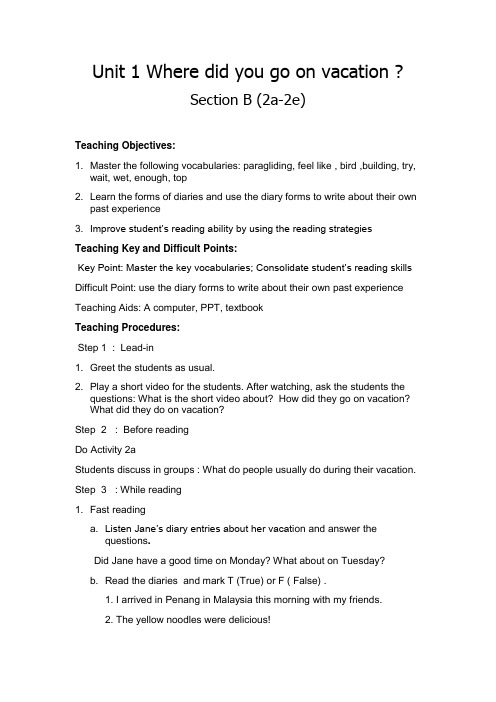
Unit 1 Where did you go on vacation ?Section B (2a-2e)Teaching Objectives:1. Master the following vocabularies: paragliding, feel like , bird ,building, try,wait, wet, enough, top2. Learn the forms of diaries and use the diary forms to write about their ownpast experience3. Improve student’s reading ability by using the reading strategies Teaching Key and Difficult Points:Key Point: Master the key vocabularies; Consolidate student’s reading skills Difficult Point: use the diary forms to write about their own past experience Teaching Aids: A computer, PPT, textbookTeaching Procedures:Step 1 : Lead-in1. Greet the students as usual.2. Play a short video for the students. After watching, ask the students thequestions: What is the short video about? How did they go on vacation?What did they do on vacation?Step 2 : Before readingDo Activity 2aStudents discuss in groups : What do people usually do during their vacation. Step 3 : While reading1. Fast readinga. Listen Jane’s diary entries about her vacati on and answer thequestions.Did Jane have a good time on Monday? What about on Tuesday?b. Read the diaries and mark T (True) or F ( False) .1. I arrived in Penang in Malaysia this morning with my friends.2. The yellow noodles were delicious!3. In the afternoon, we drove a car to Georgetown.4. My father and I decided to go to Penang Hill today.5. The weather on July 16th was fine.2. Careful readinga. Read Jane’s diary entries again. Fill in the chart in 2c .b. Complete the conversation about Jane’s trip to Penang using the information in the diary entries in 2d .Anna: Hi, Jane. Where did you go on vacation last week?Jane: I ______ to Penang in ___________.Anna: Who ______ you go with?Jane: I went with my _______.Anna: What did you do?Jane: The weather was hot and ________ on Monday, so we went_____________ on the beach. Then in the afternoon, we ______ bicycles to Georgetown.Anna: Sounds great!Jane: Well, but the next day was not as good. My ______ and I went to Penang Hill, but the weather ______ really bad and rainy. We _______ a long time for the train and we were _______ and cold because we forgot to bring an ___________.Anna: Oh, no!Jane: And that’s not all! We also didn’t bring _______ money, so we only had one bowl of rice and some fish.3. After readinga. Imagine Jane went to Penang Hill again and had a great day. Fill in the blanks in her diary entry with the correct forms of the verbs in brackets. Thursday, July 18thToday ______ (be) a beautiful day. My father and I ______ (go) to Penang Hill again, but this time we ______ (walk) to the top. We ______ (start) at 9:30 a.m. and ______ (see) lots of special Malaysian flowers along the way.About one hour later, we _______ (stop) and ______ (drink) some tea. Then we ______ (walk) for another twohours before we ______ (get) to the top. I _______ (be) quite tired, butthe city ______ (look) wonderful from the top of the hill!b The teacher shows a similar passage about travelling and students answer the questions according to the passage.Dear Sarah,We had a wonderful time here! On Monday we went to the science museum. We saw something interesting and bought some souvenirs(纪念品)in the shop there. Then we had lunch, and after that we came back to our hotel. We wrote some postcards and I sent you an e-mail. Did you get it?Yesterday it was very warm! We took a bus to the beach. We played beach volleyball there and swam in the sea. We found a lot of shells(贝壳)on the beach. We left the beach in the afternoon and got back to the hotel in the evening.I hope you are well.Jane1.Who is this letter from?2.Where did Jane go on Monday?3.What did Jane do after she came back from the museum?4.How did Jane go to the beach?5.When did Jane get back to the hotel yesterday?Step 4 : SummaryThe teacher summarizes what have learnt in this period with students.Step 5 : HomeworkWrite a composition about your vacation.。
2014年秋人教版新目标英语八年级上Unit_1_Where_did_you_go_on_vacation

Where did she go on vacation?
home She stayed at home.
Where did he go on vacation?
Hi, Bob!
He visited his uncle.
Hi, Uncle Jack!
Where did she go on vacation?
Where did you go on vacation?
I went to the mountains.
Where did you go on vacation?
I went to the beach.
Where did you go on vacation?
I visited museums.
g d
4. went to summer camp 5. went to the mountains 6. went to the beach
c
a
7. visited museums
e
瞬间记忆
呆在家 里2 做作业2 去纽约 2 拜访我 叔叔2 去夏令 营3 参观博 物馆3
去海滩3 去爬山 3
Listen and number the people in the picture. (1b)
Period 2
翻译下面的短语
• • • • • • • •
1.去度假 go on vacation 2.呆在家里 stay at home 3.去爬山 go to the mountains 4.去参加夏令营 go to summer camp 5.去沙滩 go to the beach 6.去纽约城 go to New York City 7.去看望我的叔叔 visit my uncle 8.去参观博物馆 visit museums
八年级英语上册Unit1_where_did_you_go_on_vacation_SectionA2(3a-3c)
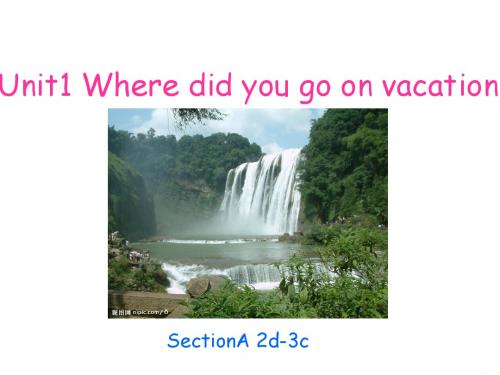
How was the food?
Did everyone have a good time.
Everything tasted really good!
Oh,yes.Everything was excellent.
语法要点:复合不定代词
• 不定代词some, any, no, every与-one, -body, 成复合代词。我们称之为复合不定代词。 -thing构
read anything interesting visit anyone in your family buy anything keep a diary Report like this:
In our group, everyone ate something at a restaurant …
3b
3c
Ask your group questions about their last vacation. Then tell the class your results.
Everyone Someone No one
Did you… eat anything at a restaurant?
3a
Fill in the blanks with the words in the box And practice the conversation
Linda: Did you do________ fun on your vacation, Alice? anything Alice: yes, I did. I went to Sanya. anyone Linda: How did you like it? something Alice: Well, it was my first time there. So __________ was really interesting. anything everything everything anyone Linda: Did you go with__________? Alice: Yes, I did. I went with my sister. nothing Linda: Did you go shopping? Alice: Of course. I bought _________ for my parents, but something __________ for myself. nothing anything Linda: Why didn’t you buy__________ for yourself? Alice: I didn’t really see anything I liked. _________
unit1 Where did you go on vacation重点精讲 人教版英语八年级上册

八上unit1 Where didi you go on vacation重点精讲重点语法精讲一、一般过去时1.动词过去式的拼写规则1).动词过去式规则变化:2).动词过去式的不规则变化:2.一般过去时结构:do 肯定句否定句一般疑问句1)肯定句:“主语+动词的过去式+其他.”I helped him to carry the heavy box last week.我上周帮他搬了这个重盒子2)否定句:“主语+did not (didn't)+动词原形+其他.”I did not (didn't) walk to school today.我今天没有走路上学。
3)一般疑问句:“Did+主语+动词原形+其他?”肯定回答:“Yes, 主语+did.”否定回答:“No, 主语+didn't.”-Did you go to the party last night?-Yes, I did./No, I didn't.—你昨晚去派对了吗?—是的,我去了。
/不,我没去。
二、复合不定代词的用法1.指物的复合不定代词1)分类something某物,anything任何事物,nothing没东西,everything 每件事;一切2)用法复合不定代词只具有名词性质,用作单数,在句中可用作主语、宾语和表语。
Everything begins to grow in spring. 春天万物开始生长了。
Something is wrong with my watch. 我的手表坏了。
I can’t see anything. 我什么也没看见。
带some的一般用于肯定句,而带any的一般用于否定句和疑问句题any在肯定句中意为“任何一个”;它们的用法同some、any的用法类似。
2.复合不定代词的特殊用法①用在表示“请求”、“建议”或希望得到对方肯定答复的疑问句中,some不用变为any。
八年级英语上册unit1Where_did_you_go_on_vacation

ppt精品课件
stay -- stayed stayed at home
go--went went to the beach went to New York City went to summer camp went to the mountains visit --- visited visited my uncle visited museums
一般过去时
构成
ppt精品课件
知识结构
动词的过去式 1. 表示过去某个时间发 生的动作或存在的状态。 2. 表示过去经常或 反复发生的动作。
一般过去时
用法
常用时间
yesterday或yesterday morning last night/week/ time.. … days ago On Sunday morning
介词+过去的年月日 in 2005;on May 15, 2000
ppt精品课件
am(is) →was are →were 翻译:他昨天在家。 陈述句:He was at home yesterday. 否定句:He wasn’t at home yesterday. 疑问句:Was he at home yesterday? Yes, he was./No, he wasn’t.
stop plan
study carry
stopped planned
studied carried
5、结尾是“辅音字母+y”的动词, 先变“y”为“i”再加—ed
The rules of the past form
2
1
played
ppt精品课件 worked
wanted decided lived
- 1、下载文档前请自行甄别文档内容的完整性,平台不提供额外的编辑、内容补充、找答案等附加服务。
- 2、"仅部分预览"的文档,不可在线预览部分如存在完整性等问题,可反馈申请退款(可完整预览的文档不适用该条件!)。
- 3、如文档侵犯您的权益,请联系客服反馈,我们会尽快为您处理(人工客服工作时间:9:00-18:30)。
复合不定代词练习
( ) 1. I’m hungry. I want ______ to eat. A. anything B. something C. everything D. nothing ( ) 2. —Do you have ______ to say for yourself? —No, I have ______ to say. A. something; everything B. nothing; something C. everything; anything D. anything; nothing ( ) 3. Why not ask ______ to help you? A. everyone B. someone C. anyone D. none ( ) 4. Everything ______ ready. We can start now. A. are B. is C. be D. were
• 复合不定代词的指代对象
• 1、含-body和-one的复合代词只用来指人,含body的复合不定代词与含-one的复合不定代词在 功能和意义上完全相同,可以互换。只是用body时显得较通俗些,多用于口语中,用-one时 显得较文雅些,更常见于正式场合及书面语中。 如: • Someone/Somebody is crying in the next room.有 人在隔壁房间哭。 • 2、含-thing的复合不定代词只用来指事物。如: • Are you going to buy an ______ with his eyes. He’s OK. A. anything wrong B. wrong something C. nothing wrong D. wrong nothing ( ) 6. —The story is so amazing! It’s the most interesting story I’ve ever read. —But I’m afraid it won’t be liked by _____. A. everybody B. somebody C. anybody D. nobody ( ) 7. She listened carefully, but heard ______. A. anyoneB. someoneC. everyoneD. nothing
I went summer camp.
I went to the mountains.
I stayed at home.
I went to the beach.
I visited the museums.
New York City
Where did he go on vacation ?
He went to New York City .
4.我们在那里拍了不少照片。
We took quite a few photos there.
5.上个月你做什么特殊的事了吗?
Did you do anything special last month?
6.我大部分时间都只是呆在家里读书休息。
I just stayed at home most of the time to read and relax.
Read the conversation 2d and match the people with the right place.
Rick
Helen
Rick: Hi, Helen. Long time no see. 好久没见了 Helen: Hi, Rick. Yes, I was on vacation last month. Rick: Oh, did you go anywhere interesting? 度假 Helen: Yes, I went to Guizhou with my family. Rick: Wow! Did you see Huangguoshu Waterfall? Helen: Yes, I did. It was wonderful. We took quite a few photos there. 相当多 What about you? Did you do 一些特殊的事 anything special last month? Rick: Not really. I just stayed at home most of the time to read and relax. 大部分时间
at home
Where did she go on vacation ? She stayed at home and cooked .
beach
Where did they go on vacation ?
They went to the beach .
mountains
Where did they go on vacation ? They went to the mountains .
不定代词的用法
买特别的东西 做无聊的事 有重要的事 没什么有趣的 去有趣的地方 不同的事 没什么开心的 有用的事 令人放松的事 没什么严重的 buy something special do something boring have something important nothing interesting go somewhere interesting something different nothing fun something useful something relaxing nothing serious
Helen: Yes, I did. It was wonderful! We took quite a few photos there. What about you? Did you do anything special last month? Rick: Not really. I just stayed at home most of the time to read and relax.
teacher
Where did she go on vacation ?
She visited her teacher.
museums
Where did they go on vacation ?
They visited museums.
summer camp
Where did they go on vacation ? They went to summer camp.
• Section A 2d
学习目标
知识目标:1.复合不定代词(anyone, anything,something,everything, nothing)含义及用法。2.一般过去式的规则 动词与不规则动词。 能力目标:Learn to talk about past events using the simple past tense. 情感目标:Talk about own vacation experience and enjoy the life.
Role-play the conversation.
Rick: Hi, Helen. Long time no see. Helen: Hi, Rick. Yes, I was on vacation last month. Rick: Oh, did you go anywhere interesting? Helen: Yes, I went to Guizhou with my family. Rick: Wow! Did you see Huangguoshu Waterfall?
3、在表示请求、邀请、提建议等带有委婉语气的疑问句,和希 望得到对方肯定答复的疑问句,以及表示反问的问句中,也用 something,someone,somebody等复合不定代词。 如:Would you like something to eat?要些吃的东西吗? 4、当anything表示“任何事(物),无论何事(物)”, anyone,anybody表示“无论谁,任何人”等意义时,它们也 可以用于肯定句中。如: Anything is OK. 什么都行。 Anybody knows the answer.任何人都知道答案。
( ) 8. I agree with most of what you said, but I don’t agree with ______. A. everything B. anything C. something D. nothing ( ) 9. —Everyone is here today, ______? —No, Han Mei isn’t here. She’s ill. A. isn’t it B. isn’t he C. are they D. isn’t everyone ( ) 10. Everything goes well, ______? A. is it B. isn’t it C. do they D. doesn’t it
复合不定代词
复合不定代词是由some-,any-,no-, every-加上-one,-body,-thing等所组 成的意思不确定定的代词。 复合不定代词包括十二个: something, somebody, someone, anything, anybody, anyone, nothing, nobody, no one, everything, everybody, everyone 这些复合代词具有名词性质,在句中可 用作主语、宾语或表语,但不能用作定 语。
play soccer go to the beach go to the movies stay at home do some reading study for the test
